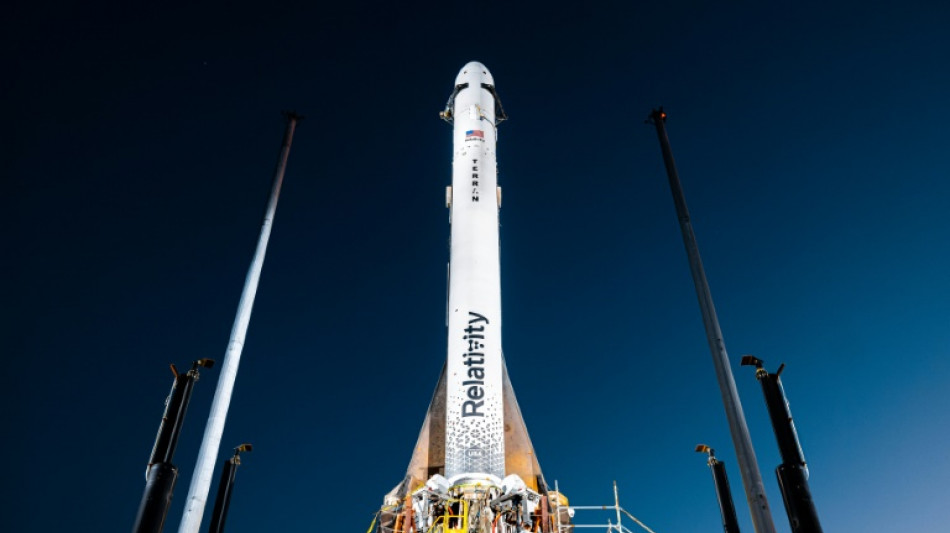
-
 Spanish singer Julio Iglesias prepares defence against abuse allegations: Hola! magazine
Spanish singer Julio Iglesias prepares defence against abuse allegations: Hola! magazine
-
Actor McConaughey seeks to patent image to protect from AI

-
 Musk's Grok barred from undressing images after global backlash
Musk's Grok barred from undressing images after global backlash
-
Hosts Morocco set up Senegal AFCON final showdown

-
 Trump says Iran killings stopped, Tehran says 'no plan for hanging'
Trump says Iran killings stopped, Tehran says 'no plan for hanging'
-
Chelsea paid for costly errors in Arsenal defeat, says Rosenior

-
 Morocco beat Nigeria on penalties to reach Africa Cup of Nations final
Morocco beat Nigeria on penalties to reach Africa Cup of Nations final
-
Golden Globes viewership shrinks again

-
 Astronauts leave ISS in first-ever medical evacuation
Astronauts leave ISS in first-ever medical evacuation
-
NASA reports record heat but omits reference to climate change

-
 Trump praises 'terrific' new Venezuela leader after call
Trump praises 'terrific' new Venezuela leader after call
-
Real Madrid crash out of Copa del Rey at Albacete on Arbeloa debut

-
 Trump says Iran killings stopped as US scales back Qatar base
Trump says Iran killings stopped as US scales back Qatar base
-
Arsenal beat Rosenior's Chelsea in League Cup semi first leg

-
 US stocks fall again as Iran worries lift oil prices
US stocks fall again as Iran worries lift oil prices
-
Inter extend Serie A lead to six points after Napoli slip

-
 Bayern beat Cologne to move 11 points clear in Bundesliga
Bayern beat Cologne to move 11 points clear in Bundesliga
-
Mane takes Senegal past Egypt into final of his last AFCON

-
 Trump says Greenland will 'work out' after Denmark fails to bridge gap
Trump says Greenland will 'work out' after Denmark fails to bridge gap
-
'Bridgerton' premieres in Paris promising 'Cinderella with a twist'

-
 California begins probe of Musk's Grok over sexualized AI images
California begins probe of Musk's Grok over sexualized AI images
-
Astronauts set to leave ISS in first-ever medical evacuation

-
 Napoli's stalemate with Parma opens door for Serie A leaders Inter
Napoli's stalemate with Parma opens door for Serie A leaders Inter
-
Syrian leader urges Kurdish integration as army sends troops east of Aleppo

-
 Denmark says White House talks failed to alter US designs on Greenland
Denmark says White House talks failed to alter US designs on Greenland
-
Venezuela looking to 'new era' after Maduro ouster, says interim leader

-
 Mane takes dominant Senegal past Egypt into AFCON final
Mane takes dominant Senegal past Egypt into AFCON final
-
UK police admit 'mistakes' over Maccabi Tel Aviv fan ban

-
 Promoter says Joshua will return to ring when 'time is right' after horror crash
Promoter says Joshua will return to ring when 'time is right' after horror crash
-
California investigating Grok AI over lewd fake images

-
 Wales's Faletau set to miss bulk of Six Nations
Wales's Faletau set to miss bulk of Six Nations
-
Denmark, Greenland wrap up crunch White House talks

-
 England sweating on Fin Smith's fitness for Six Nations opener
England sweating on Fin Smith's fitness for Six Nations opener
-
NASA acknowledges record heat but avoids referencing climate change

-
 England rugby league coach Wane quits role
England rugby league coach Wane quits role
-
Oil prices extend gains on Iran worries

-
 European basketball pioneer Schrempf lauds 'global' NBA
European basketball pioneer Schrempf lauds 'global' NBA
-
Denmark, Greenland in crunch White House talks as Trump ups pressure

-
 Mitchell hits ton as New Zealand down India to level ODI series
Mitchell hits ton as New Zealand down India to level ODI series
-
Syrian army tells civilians to stay away from Kurdish positions east of Aleppo

-
 Spurs sign England midfielder Gallagher from Atletico Madrid
Spurs sign England midfielder Gallagher from Atletico Madrid
-
Russian captain tried to avoid North Sea crash: court

-
 Battle over Chinese-owned chipmaker Nexperia rages in Dutch court
Battle over Chinese-owned chipmaker Nexperia rages in Dutch court
-
Transatlantic ties 'disintegrating': German vice chancellor

-
 Five problems facing Ukraine's new defence chief
Five problems facing Ukraine's new defence chief
-
Italian influencer Ferragni acquitted in Christmas cake fraud trial

-
 UK interior minister says 'lost confidence' in police chief over Maccabi fan ban
UK interior minister says 'lost confidence' in police chief over Maccabi fan ban
-
Ryanair hits out at 'stupid' Belgium over aviation taxes

-
 Burkina Faso sack coach Traore after AFCON exit
Burkina Faso sack coach Traore after AFCON exit
-
African manufacturers welcome US trade deal, call to finalise it


Launch of world's first 3D-printed rocket canceled at last second
The launch of the world's first 3D-printed rocket was ultimately scrubbed after several tries on Saturday, marking a new setback for the private owner of an innovative spacecraft billed as being less costly to produce and fly.
Engines had begun igniting on the unmanned Terran 1 rocket, built by California aerospace startup Relativity Space, when an "automation" issue caused the company to abort takeoff for the second time in less than a week.
A little later, the company tried again to launch the spacecraft from Florida's Cape Canaveral but had to abort due to pressure issues in the rocket's second stage, the company later tweeted.
"The team went HARD today and we intend to do so during our next attempt. More to come on the new launch date," Relativity said.
At one point during the three-hour launch window, which began at 1:00 pm (1800 GMT), the countdown was put on hold when a private boat violated a danger zone.
An earlier scheduled launch last Wednesday was also postponed over last-minute propellant temperature issues.
Once it does take off, Terran 1 is set to reach low Earth orbit after eight minutes on a voyage intended to gather data and demonstrate that a 3D-printed rocket can withstand the rigors of liftoff and space flight.
If the rocket manages to attain low Earth orbit, it will be the first privately funded vehicle using methane fuel to do so on its first try, according to Relativity.
Terran 1 is not expected to carry a payload for its first flight, but the rocket will eventually be capable of putting up to 2,755 pounds (1,250 kilograms) into low Earth orbit.
The rocket is 110 feet (33.5 meters) tall with a diameter of 7.5 feet (2.2 meters).
Eighty-five percent of its mass is 3D printed with metal alloys, including the engines.
It is the largest ever 3D printed object, according to the Long Beach-based company, and is made, it says, with the world's largest 3D metal printers.
- Built in 60 days -
Relativity's goal is to produce a rocket that is 95 percent 3D printed.
Terran 1 is powered by Aeon engines using liquid oxygen and liquid natural gas -- the "propellants of the future," capable of eventually fueling a voyage to Mars, Relativity says.
Vulcan rockets being developed by United Launch Alliance and SpaceX's Starship use the same fuel.
Terran 1 has nine 3D-printed Aeon 1 engines on its first stage and one 3D-printed Aeon Vacuum engine on its second stage.
Relativity is also building a larger rocket, Terran R, capable of putting a payload of 44,000 pounds (20,000 kgs) into low Earth orbit.
The first launch of a Terran R, which is designed to be fully reusable, is scheduled for next year from Cape Canaveral.
A satellite operator can wait for years for a spot on an Arianespace or SpaceX rocket, and Relativity Space hopes to accelerate the timeline with its 3D-printed rockets.
"Long-term, a major benefit of 3D printing is the ability to more rapidly democratize space due to the incredible cost effectiveness, radical flexibility and customization," the company said.
Relativity said its 3D-printed rockets use 100 times fewer parts than traditional rockets, and can be built from raw materials in just 60 days.
Relativity has already signed commercial launch contracts worth $1.65 billion, mostly for the Terran R, according to CEO Tim Ellis, who co-founded the company in 2015.
"Medium-heavy lift is clearly where the biggest market opportunity is for the remaining decade, with a massive launch shortage in this payload class," Ellis tweeted.
G.AbuGhazaleh--SF-PST



